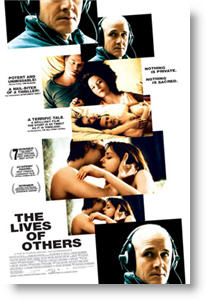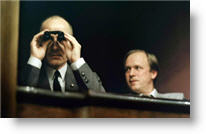The Lives of Others
 for sexuality/nudity.
for sexuality/nudity.
Reviewed by: Rev. Grant Wright
CONTRIBUTOR
| Moral Rating: | Offensive |
| Moviemaking Quality: |
|
| Primary Audience: | Adults |
| Genre: | Foreign Political Action Thriller |
| Length: | 2 hr. 17 min. |
| Year of Release: | 2007 |
| USA Release: |
February 9, 2007 DVD release: August 21, 2007 |











Suicide, what does the Bible say? Answer
If a Christian commits suicide, will they go to Heaven? Answer
| Featuring |
|---|
| Martina Gedeck, Ulrich Muehe, Sebastian Koch, Ulrich Tukur, Thomas Thieme |
| Director |
|
Florian Henckel von Donnersmarck |
| Producer |
| Quirin Berg, Max Wiedemann, Dirk Hamm |
| Distributor |
“Before the fall of the Berlin Wall, East Germany’s Secret Police listened to your secrets”
Captain Wiesler (Ulrich Mühe) a devoted stasi officer is given the task of monitoring and gathering evidence against a famous play write Georg Dreyman (Sebastian Koch). However, this is motivated by Minister Hempf who is more interested in Dreyman’s girlfriend, actor Christa-Maria. This sets the scene for a film of surveillance, political abuse, and, in the end, compassion.
The title “The Lives of Others” comes from Wiesler’s lack of a life as he becomes the full time surveillance of Dreyman. He becomes obsessed with the lives of Dreyman and Christa-Maria, beginning to see them for what they are, people who care about the state of their country. It isn’t long before Wiesler becomes their unbeknown protector. This is not your typical cat and mouse film, but rather the cat trying to protect the mouse from the larger, meaner cat.
This is a foreign film and plays out like one. It may seem a little slow to the typical American audience, but those who enjoy good story telling will enjoy this film immensely. At times, the dialogue in German is fast, and it was a slight strain to keep up with the subtitles.
From a moral standpoint, this film is not perfect. I was expecting worse, since it is a foreign film, but most of the sensual scenes were shot artistically, including Christa-Maria showering, where only her back is exposed and her arms cover a side profile. One scene with a prostitute in Wiesler’s apartment reveals breasts. The language, for the most part, was good with two slips of the F-word and one S-word.
From a Christian perspective, I really focused in on the compassion and sacrifice shown in this film. Although it is very different from what Jesus has done for us in His work on the cross, I cannot help but draw parallels. Dreyman did not know how much trouble he was in, but someone who was watching and cared about him did. This caring watcher stepped in to help Dreyman in his time of need. God doesn’t just love me because I follow Jesus, He first loved us while we were yet sinners (Romans 5:8). God has stepped into our lives and done something about the trouble we are in, even though we really don’t know how lost we truly are. What Wiesler did for Dreyman is compassion, what God has done for us is grace.
Violence: Mild / Profanity: Mild / Sex/Nudity: Moderate
See list of Relevant Issues—questions-and-answers.


The man is the state’s perfect paramour, but his own worst enemy, until he undergoes a conversion. He gains a new life when he loses his old one—his story is a metaphor for Twentieth Century Europe and for the entire human experience. This is a beautiful cinematic story infused with much more light and hope than the dark and creepy “Pan’s Labyrinth,” another recent foreign language film dealing, but not as well, with the evils of totalitarianism. “The Lives of Others” is about real heroism—refreshing in the way “United 93” and even “300” have been, and a welcome departure from the heroism as desperation theme that weighed down recent movies such as “The Departed,” “Flags of Our Fathers,” and “Zodiac.”
Average / 4½
Some will say that Gerd was right to use lies and deceit in this way because of the favourable outcome he intended and achieved, arguing from an ethics of consequences viewpoint. Other may say he was right because the principle of protecting life trumps the principle of truth, arguing from an ethics of ranked principles. Some Christians would support one or other of these views, and others would take a firmer line on the need for truth telling, despite likely adverse consequences. …
Average / 4
Wiesler, who reminded me more of a robot at the beginning of the movie, is exposed to Dreymann’s compassion because of his job, but still, Dreymann’s compassion is rubbing off on him. More and more Wiesler is beginning to realise that Dreymann is right with his criticism and acts accordingly. Especially the scene with the prostitute seemed like an epiphany to me. I admit that the scene is not unproblematic (nudity and sex with a prostitute), but it is still not about lust. The whole scene is so empty, and void of emotion, and even satisfaction that one can literally feel that Wiesler does not need empty sex, but something else, namely compassion.
If I remember correctly then this is stressed even more when Wiesler is asking the prostitute to stay a little longer. It is not explicitly said whether Wiesler wants to sleep with her again or whether he is just hoping to be able to talk with another human being, but personally I came to the conclusion that the latter was implied. Unfortunately, or maybe rather fortunately the prostitute rejects him though and reminds him that there are other customers waiting for her. In this moment Wiesler seems to understand how depressing his country is and why the suicide rate is so high.
Dreymann, on the other hand, has his beloved girlfriend, his art and his compassion and by spying on him Wiesler is able to get an idea of what love and compassion really mean. This is even more supported by the fact that the state, or rather a corrupt representative of the state, ordered Wiesler to destroy Dreymann’s life. Maybe for the first time Wiesler experiences a man who is truly experiencing love, something that is definitely not a part of Wiesler’s own life, and all of a sudden Wiesler also realises how valuable love and compassion really are. He understands this so well that he is willing to sacrifice his own career just so that he is able to defend the only man he knows who really lives: Dreymann Last but not least I must say that the movie is not entirely unproblematic, but it is still an inspiring movie that is even teaching a Christian core value, namely love.
It also shows that a life that is guided by love and compassion can have a more positive impact here in this world than one should think. Dreymann, for instance, has no intention whatsoever to have a positive impact on Wiesler’s life, he does not even know him, but his compassion is still a powerful force that still gives Wiesler a ray of hope.
Moral rating: Average / Moviemaking quality: 5
Despite this commendable message, the movie is hampered by some negative content, most notably a semi-brief but explicit sex scene.
Moral rating: Offensive / Moviemaking quality: 5




My Ratings: Offensive / 5